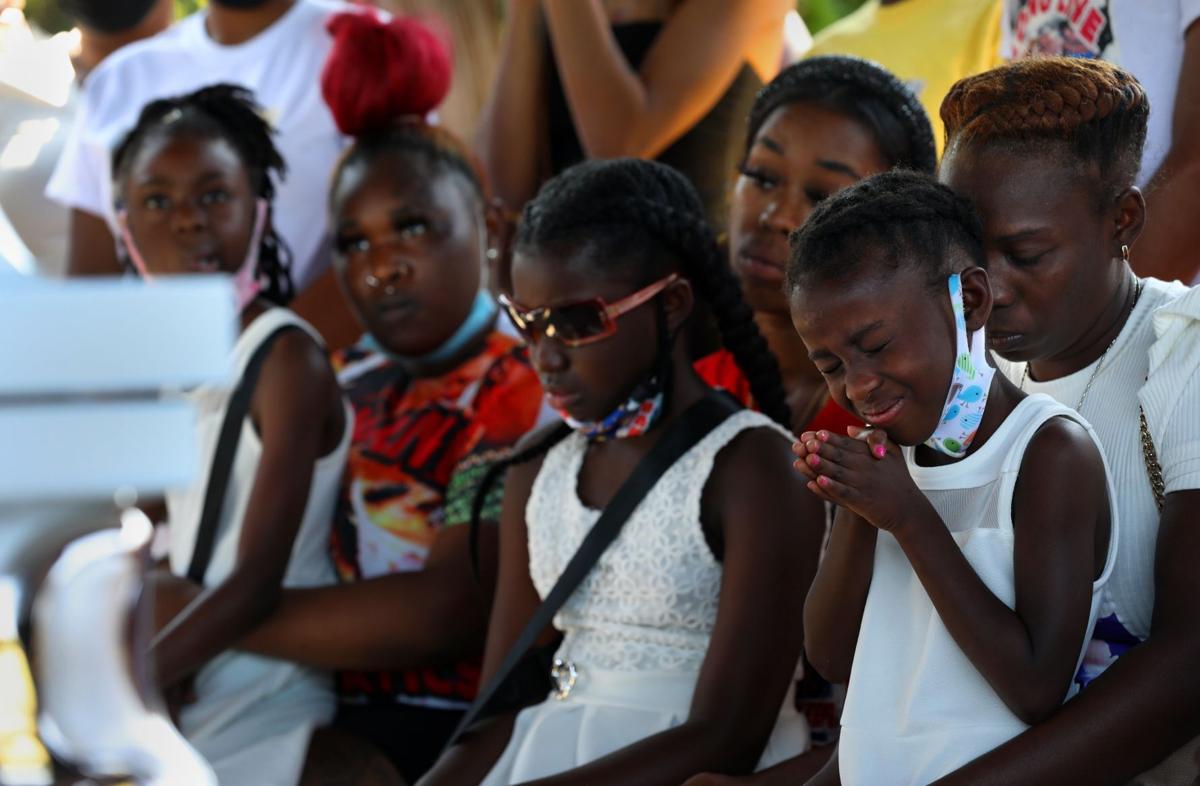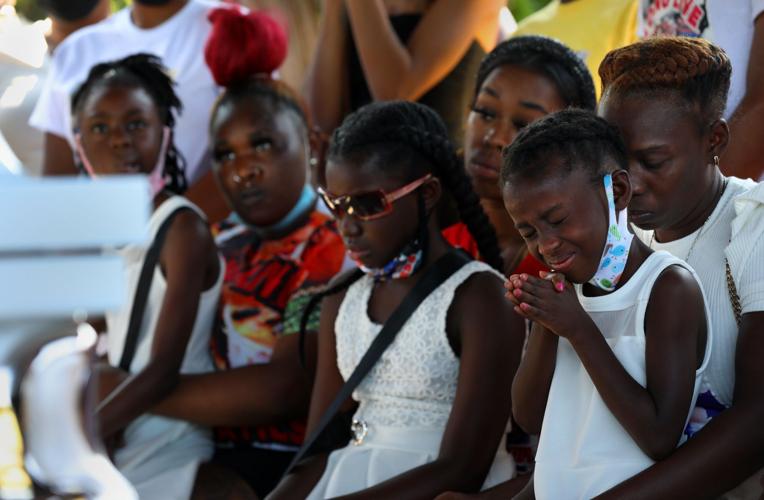KANSAS CITY â Frank Randle was pulling his truck onto the parking lot of 9ine Ultra Lounge for his shift as a security guard at the club in January 2020 when chaos broke out.
Gunshots pierced the frigid air as people ran in all directions, screaming and trampling each other. In his rearview mirror, he saw a woman on the ground bleeding.
Just feet from his truck, Randle saw a man with a Draco AK-style rifle firing into a crowd of people waiting to get into the nightclub. The shooting killed a young woman and injured 16 people.
âAt that point, I had done security work for many different venues for 15 years. But that one night, that was just the one that was the most unreal one I have ever been a part of,â said Randle, who has since stopped working security because he no longer felt safe.
âIâve seen people shot at or shot, but not like that.â
People are also reading…

In separate incidents in 2020, 19 people were shot, and two others were killed at the 9ine Ultra Lounge in Kansas City. The nightclub is located is a strip shopping center near U.S. Highway 40 and Noland Road.
In the days after the shooting, Jackson County Prosecutor Jean Peters Baker pointed out it might not have happened but for rollbacks in Missouri gun laws.
Over the past two decades, Missouri lawmakers have dismantled virtually all the stateâs significant gun restrictions, putting the state in the country.
Legislative action has included repealing permit and safety training requirements to buy guns and carry them concealed, as well as expanding legal safeguards for using deadly force in self-defense.
Researchers point to the 2007 legislative session specifically for its repeal of the requirement to obtain a permit to purchase a handgun.
That piece of legislation led to 49 to 68 additional firearms deaths each year in Missouri over the following decade, Johns Hopkins researchers found.
Jolie Justus, a freshman senator from Kansas City in 2007, said she recognized what was going on: The Missouri General Assembly was carrying out a long-term strategy, orchestrated by the National Rifle Association, to take apart gun laws piece by piece, until there was virtually nothing left.
âOne of the things that just really concerned me at the time was what appeared to be the slow chipping away at all of the regulations that we had relating to firearms in the state of Missouri,â said Justus, who served as a state senator from 2006 to 2014 and was one of the few to vote against the bill.
âI felt very strongly that we had a public health crisis related to gun violence and that there was nothing that removing regulations â common-sense regulations â would do to help that crisis. It would only make things worse.â
Former lawmakers, advocates and experts on gun policy agree that Missouri was part of a nationwide NRA effort to politicize firearms ownership and push for looser gun regulations to expand Second Amendment rights.
Multiple attempts to reach the NRA and the Missouri Firearms Coalition went unanswered.
To understand what happened, the Star looked at how those in the General Assembly at the time voted on Senate Bill 62, the omnibus crime bill that included the repeal of permit to purchase.
The Star reached out to 50 former lawmakers who served in 2007; all have left office. Of the 10 who responded, most said they couldnât remember discussing or voting on removing permit to purchase.
In 2007, opposition to the bill was virtually nonexistent â 108 Republicans and 73 Democrats voted yes, while only nine Democrats voted no. Seven lawmakers were absent for the vote.
After the permit requirement was removed, the stateâs firearms death rate had increased 58% by 2019, according to a Star analysis of state firearms death figures. The actual toll may be higher, as some local law enforcement agencies recorded higher numbers of deaths in their counties than the state reported.
âWhen thereâs a process where you have to get a permit to purchase, that seems like itâs just a bureaucratic thing, what does that matter? But it turns out it matters more than any other gun law or any other public policy that I can think of,â said Daniel Webster, director of the Johns Hopkins Center for Gun Policy and Research.
While firearms deaths doubled in St Louis County and Jackson County during that 10-year period, the effects werenât limited to urban areas. Several rural counties saw sharp spikes in suicides.
âI wish we had had more foresight if that truly would have prevented deaths. But even if we had foreseen this, I doubt the legislative outcome wouldâve changed,â said Jeff Smith, a Democrat from șüÀêÊÓÆ” who served in the state Senate in 2007 and was absent for the vote on the bill repealing permit to purchase.
âThree things you can count on are death, taxes and the Missouri Legislature passing a gun bill every election cycle,â Smith said.
This year, the Legislature passed one of the most expansive gun rights laws in the country, called the Second Amendment Preservation Act.
The new law establishes that state firearms laws trump federal ones, going as far as to penalize local law enforcement $50,000 per infraction if they are found to be working with federal agencies, such as the Bureau of Alcohol, Tobacco, Firearms and Explosives or the FBI, on gun-related crimes.
âMistakes will happenâ
Passage of the 2007 bill came with little fanfare. Other legislation from the session received far more attention, such as reforming the stateâs Medicaid program, restricting abortion access and declaring English the official language of Missouri.
eliminated a provision that had been in place since 1921 requiring handgun buyers to get a permit from their county sheriff or police department before purchasing the firearm. The permitting process gave law enforcement seven days to review an application and conduct a background check.
Though support for the bill was strong, financial contributions from the NRA and other pro-gun groups amounted to very little around that time. A total of $1,700 was given to four Republican Missouri House members, and five Republican senators received a total of $6,600, according to the National Institute on Money in Politicsâ Follow the Money database.
In the Starâs effort to reach lawmakers who served in 2007, most declined to speak or didnât respond to requests for comment.
Jack A.L. Goodman, the Republican state senator from Lawrence County who sponsored the bill, declined to comment as he currently serves as a judge for the Southern District of the Missouri Court of Appeals. Lawrence Countyâs firearms deaths increased by 32%, from nine to 12, from 2007 to 2018.
Allen Icet, a former House Republican from șüÀêÊÓÆ”, said he voted in favor of the repeal to reduce the number of hoops someone has to jump through to get a gun.
Icet, who lost a relative to firearm suicide, said he would vote the same way today.
âI would come at it from the constitutional framework, the rights of Americans to possess firearms,â Icet said. âIf I had to choose one side, I would be against the permit-to-purchase requirement.â
Jake Zimmerman, a Democrat who served as a state representative from Olivette and is now șüÀêÊÓÆ” County assessor, said he does not remember the legislation. He voted yes on the bill.
âWhen I was serving in the Legislature, gun violence was a serious problem in Missouri and nationwide. Sadly, itâs still at epidemic levels. I strongly support all efforts to curb this terrible scourge,â Zimmerman said.
Multiple attempts to reach Gov. Mike Parson, who served in the General Assembly as a representative in 2007 and a senator in 2016, and Matt Blunt, Missouriâs governor in 2007, went unanswered.
Jeanette Mott Oxford, a former state representative from șüÀêÊÓÆ”, also does not remember the bill but was one of the few who voted against it.

Jeanette Mott Oxford, a former state representative from șüÀêÊÓÆ”, does not remember the repeal of permit to purchase bill but was one of the few who voted against it. MICHAEL B. THOMAS SPECIAL TO THE KANSAS CITY STAR
Mott Oxford was always suspicious of last minute omnibus bills.
âWe would get these omnibus bills laid on our desk that would come in the middle of the night, and I would be very worried that in some bill 300 to 500 pages long, that there would be something appalling in there and then I wouldnât be saying yes to it,â Mott Oxford said. âI figured that to err on the side of caution was the wisest thing to do in those situations.â
Mott Oxford, citing the study finding that the lawâs repeal increased gun violence in the state, says the consequences of the 2007 bill arenât surprising.
âA lot of people would claim that thereâs no connection or whatever,â Mott Oxford said. âBut certainly, it seems to me that a lot of people make snap judgments. And if itâs easy to get their hands on a gun, a lot of mistakes will happen.â
Studying gun laws
The repeal of permits to purchase led to , in firearms homicides and a 23.5% increase in firearms suicides in Missouri in the years since it passed, .
Webster, one of the authors on the study examining the effects of 2007âs repeal, studies gun laws throughout the U.S. to identify the effect they have on firearms deaths.
He considers the 2007 repeal to be one of the most important firearms regulatory rollbacks in the state.
âAround the time of this change of the repeal, we documented a two-fold increase in guns moving from a retail sale to crime involvement in less than a year,â in Missouri, Webster said. âThatâs very unusual.â
âThe gun stock, or guns that people generally possess that are relatively old, is usually 10 or more years old. To get a sudden shift that currently more criminals are being arrested with these pretty new guns tells you itâs more likely to be a regulatory thing thatâs going on.â
In other studies, researchers from a variety of Missouri universities and hospitals found the repeal was associated with a 21.8% increase in firearms suicide rates in young adults ages 19-24.
While the reasons for suicides are complex, advocates and mental health professionals say the easy availability of guns, minimal access to resources and concentrated poverty are contributing factors, especially for rural communities.
In contrast, after Connecticut passed a version of permit-to-purchase in 1995, it saw a 40% reduction in firearms homicide rates during the first 10 years the law was in place, according to a companion study examining gun law changes. The law also strengthened background checks, raised the handgun purchasing age to 21 from 18, required prospective buyers to apply for the permit in person at a local police station and mandated at least eight hours of approved handgun safety training.
âPerfect stormâ
In September 2016, Kimberly M. Gardner knew she had to try one last time to convince her colleagues in the Missouri House of Representatives to vote against a bill she believed would make life more dangerous for people in all corners of the state, especially in șüÀêÊÓÆ”.
Already the cityâs presumptive next circuit attorney, Gardner was about to cast her last House vote.

șüÀêÊÓÆ” Circuit Attorney Kim Gardner, a former state representative from șüÀêÊÓÆ” in 2016, argued against overriding then-Gov. Jay Nixon's veto on legislation that would allow for permitless concealed carry of firearms, eliminate the safety training requirement to carry a firearm and legalize stand your ground law. MICHAEL B. THOMAS/ SPECIAL TO THE KANSAS CITY STAR
She was arguing against overriding then-Gov. Jay Nixonâs veto of the wide-ranging and controversial legislation that would allow concealed carry of firearms without a permit, eliminate the safety training requirement to carry a firearm and legalize the âstand your groundâ law.
By giving broader access to guns and simultaneously decreasing the standards for self defense, Gardner argued, the Legislature was going to make her job harder as a prosecutor.
âWe can find a balance for your Second Amendment rights, but at the same time, we can stand with law enforcement who is against this bill, we can stand with prosecutors who are against this bill, we can stand with sheriffâs officers around this area that are against this bill, because they know that blurred line, it costs lives,â she said. âIt costs innocent lives.â
As soon as Gardner finished, a representative from Franklin County got up to address what he called the âhypocrisy behind some of this nonsensical rambling we just heard.â
A combined chorus of some whoops, but mostly boos, immediately erupted from legislators in the chamber, until the speaker called for decorum.
Law enforcement, gun owners and people who taught permit training courses all testified in opposition to the permitless concealed carry bill, recalled Kristin Bowen, a gun safety advocate from Columbia and volunteer with Moms Demand Action.
âIt was really distressing. It was very frustrating for me as an activist to see our local laws, our local law enforcement voices and our public safety experts being overlooked,â Bowen said.
Springfield police Chief Paul Williams was president of the Missouri Police Chiefs Association in 2016. He said the organization fought against the bill.
âOur concealed carry permitting process was the gold standard,â Williams said. âIt restricted folks in a good way, we were able to deny certain people from carrying a gun or we were able to remove guns.â
Following a short debate â during which the billâs supporters argued that it would give people even more rights to protect themselves â the veto override easily passed, almost entirely along party lines.
Permitless concealed carry and stand your ground became law.
âI stood up on the House floor and I said this is creating the perfect storm of hopelessness,â Gardner said in an interview last month. âWe are seeing the effects of what I said on that floor come to fruition.â
As Gardner predicted five years ago, gun violence in șüÀêÊÓÆ” has increased. In 2016, 177 people died by firearm homicide in șüÀêÊÓÆ”, according to the Starâs analysis of police data. In 2020, that number increased to 266 firearm homicides â a 50% increase. The total includes homicides that were determined to be justifiable.
The rise in firearms deaths canât entirely be linked to one law. Gardner believes that the problem is the deregulation of firearms combined with deficits in social determinants of health found in many of Missouriâs communities â deficits such as disparities in income, housing, healthy living environments, food insecurity and quality education.
âA white flagâ
The shooting outside the 9ine Ultra Lounge in Kansas City unfolded within minutes last year.
Jahron Swift, 29, of Kansas City, had gotten into a disagreement with some of the people waiting to get inside. Witnesses said he was looking for a lost cellphone. One of the men in line shoved Swift, and he tripped off the curb. Swift got up and walked across the parking lot.
When he returned, he was carrying the Draco AK-style rifle. He fired into the crowd. He kept pulling the trigger even after he ran out of bullets, witnesses said.
It took only seconds for the shooter to kill one person and injure 16 others.
In a recent interview, Jackson Countyâs prosecutor said Swift likely would have been in prison in January 2020 and the shooting might not have happened if it werenât for the passage of permitless concealed carry in Missouri.
In 2015, Bakerâs office had charged Swift with unlawful use of a weapon and possessing a controlled substance. While that case was pending, Swift was charged again with unlawful use of a weapon in 2016.
The second charge came around the time the Missouri Legislature repealed the requirement for permits to carry a concealed weapon. Bakerâs office dropped the charges in accordance with the new law.
A large problem with Missouriâs race to deregulate firearms is that it tied the hands of law enforcement, said Baker and Gardner.
Passage of the laws didnât stop the criminal activities that can lead to shootings, Baker said; itâs just now more difficult for law enforcement to take weapons away.
âI donât mean this in the literal sense, but we are flying a white flag outside the prosecuting attorneyâs office, you know, because weâre just like, âwe give up, we give up.â I mean, on guns, honestly, itâs hard to know what more they could do,â she said.
Baker recalls legislators publicly getting upset with her for pointing out the role the gun law change played in the 9ine Ultra Lounge shooting.
âTheyâre pretty thin skinned. They make these law changes, these dramatic sweeps and changes, and then they donât want there to ever be any negative consequences for it,â she said. âThat guy was a negative consequence.â
As for Randle, the 9ine Ultra security guard, he now works in shipping.
âThereâs so many unnecessary shootings, and people that shouldnât have had guns or any type of firearm have them,â he said.
âThat could have been me out there.â
Julian Nazar, Joy Mazur, Sophie MĂ©nard, Zoe Hormell, Laura Evans, Khue Nguyen, Mallory Daily, Skylar Laird and Grace Zokovitch, students from the University of Missouri School of Journalism, and Jason Hancock of the Missouri Independent contributed to this report.













